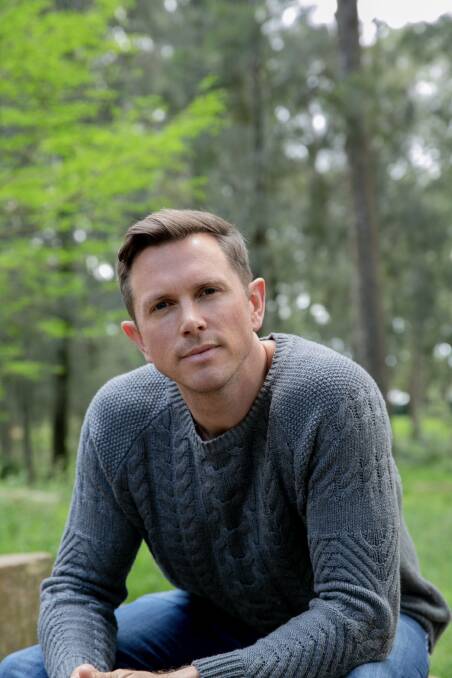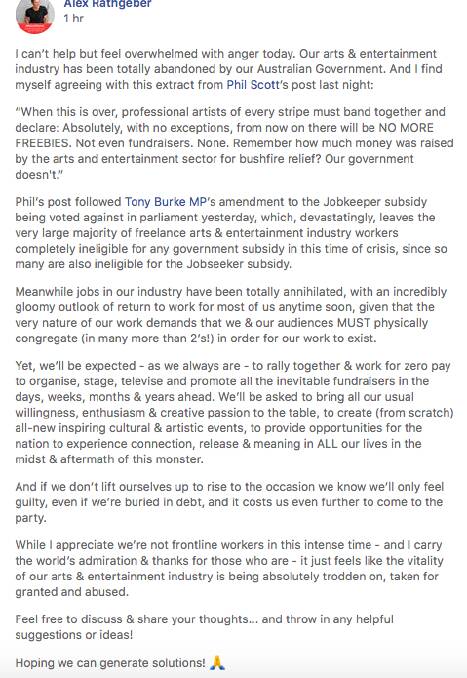
ALEX Rathgeber knows people in the Wimmera and across Australia value the Arts.
Subscribe now for unlimited access.
$0/
(min cost $0)
or signup to continue reading
He knows DJs livestreaming sets on social media, videos of theatre company productions and services like Netflix and Stan are helping keep people sane while they self-isolate.
He says he wants the federal government to value it too.
On Wednesday, a reduced parliament passed $130 billion worth of wage subsidies to incentivise businesses not to let staff go during the coronavirus pandemic, known as JobKeeper.
VOICE OF REAL AUSTRALIA: Creativity is the glue keeping humanity connected right now
However, an amendment that would have seen more Arts professionals able to access the benefits was voted down.
Mr Rathgeber said despite other support measures being announced, the outcome in parliament left he and many others in the industry "gobsmacked".
"I think first and foremost it really does come down to the leaders of our country assuming the responsibility to place value upon us, where it ought to be already, and hopefully then people will listen to that and act accordingly," he said.
"I realise it is not just Arts and Entertainment workers that are falling through some cracks. Wherever people fall through the cracks it has to be looked at.
"If you are a gigging actor, technician or publicist, in any area of the industry, you tend to - unless you work for a subsidised theatre company and had a contract for several years - the majority of people go from job to job. Some of those jobs last a few days, a few months if you're lucky."
Read more:
In the past year, Mr Rathgeber has starred in Horsham's Richard Morris Annual Showcase, the Australian premiere of Jekyll and Hyde the musical in Melbourne and Sydney, and Christmas Actually, a concert with music from the british film Love Actually, in Brisbane.
He is currently living with his partner Tom, an architect, in Tom's mother's house in Sydney.
The pair were set to relocate to New York in late March, where Mr Rathgeber hoped to work on Broadway. His disappointment in not being able to go quickly turned to relief as New York became a war zone with a death toll to match.
"It feels trivial to talk about my plan to move now," he said.
Mr Rathgeber said the industry had stopped - with productions closing down and workers being let go - since social distancing measures had been brought in to slow the spread of COVID-19.
"I don't know the percentages, but similar to Broadway, the West End and theatres around the world, they have closed an everyone's work has stopped," he said.
"In normal circumstances, if a show were to close, the producers would have to give certain amount of notice, which requires them to pay out a certain number of weeks. I've been in that situation a couple of times... where (organisers) project a show might run for months, and for whatever reason it doesn't sell and they have to cancel a leg of the tour.
"But in this case tey aren't going to be able to sell tickets for months, so everyone has been laid off. Everyone has only got a couple of week's notice, and most people aren't getting any sort of retainer or monetary compensation for their job having stopped.
"Shows are so expensive to produce in the first place, that producers can't afford to do that like they might be able to in other industries."

Mr Rathgeber said he knew of Arts professionals having to refinance their mortgages and move to more affordable accommodation having lost their income.
"Being an Arts professional is tough at the best of times: You are piecing together an existence of very short contracts, and often using the finances you acquire from those gigs to sustain you for the periods in between," he said.
"The risk with this hole situation is not only does it come down to practical things like paying rent and the essentials, but it's the knock on effect: The mental health figures for Arts and Entertainment is already staggeringly poor, and there is a danger of that becoming worse if it hasn't already.
"That is why I think government action like a rescue package... it should have happened on Thursday, and it has to happen as close to tomorrow as possible."
Though the amendment was defeated, on Thursday the government announced $27 million in targeted support for the Arts industry.
Arts Minister Paul Fletcher said it will spend $10 million to help regional artists and organisations develop new work and explore new delivery models through the Regional Arts Australia's Regional Arts Fund.
It will also spend $10 million on music industry charity Support Act, which will provide crisis relief to artists, crew and music workers who have lost their jobs and income as a result of COVID-19.
The final $7 million will go to the Indigenous Visual Arts Industry Support to support Traditional Owner artists and arts centres.
The government estimates there were 244,500 people employed in Arts and Recreation Services in November 2018.
While the Australian Bureau of Statistics reports only 47 per cent of businesses in this industry were still trading as of March 30. Businesses in this industry account for one per cent of all Australian businesses.
We have removed our paywall from our stories about the coronavirus. This is a rapidly changing situation and we want to make sure our readers are as informed as possible. If you would like to support our journalists you can subscribe here.


